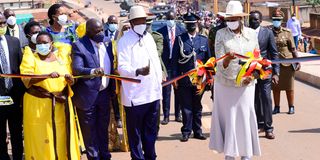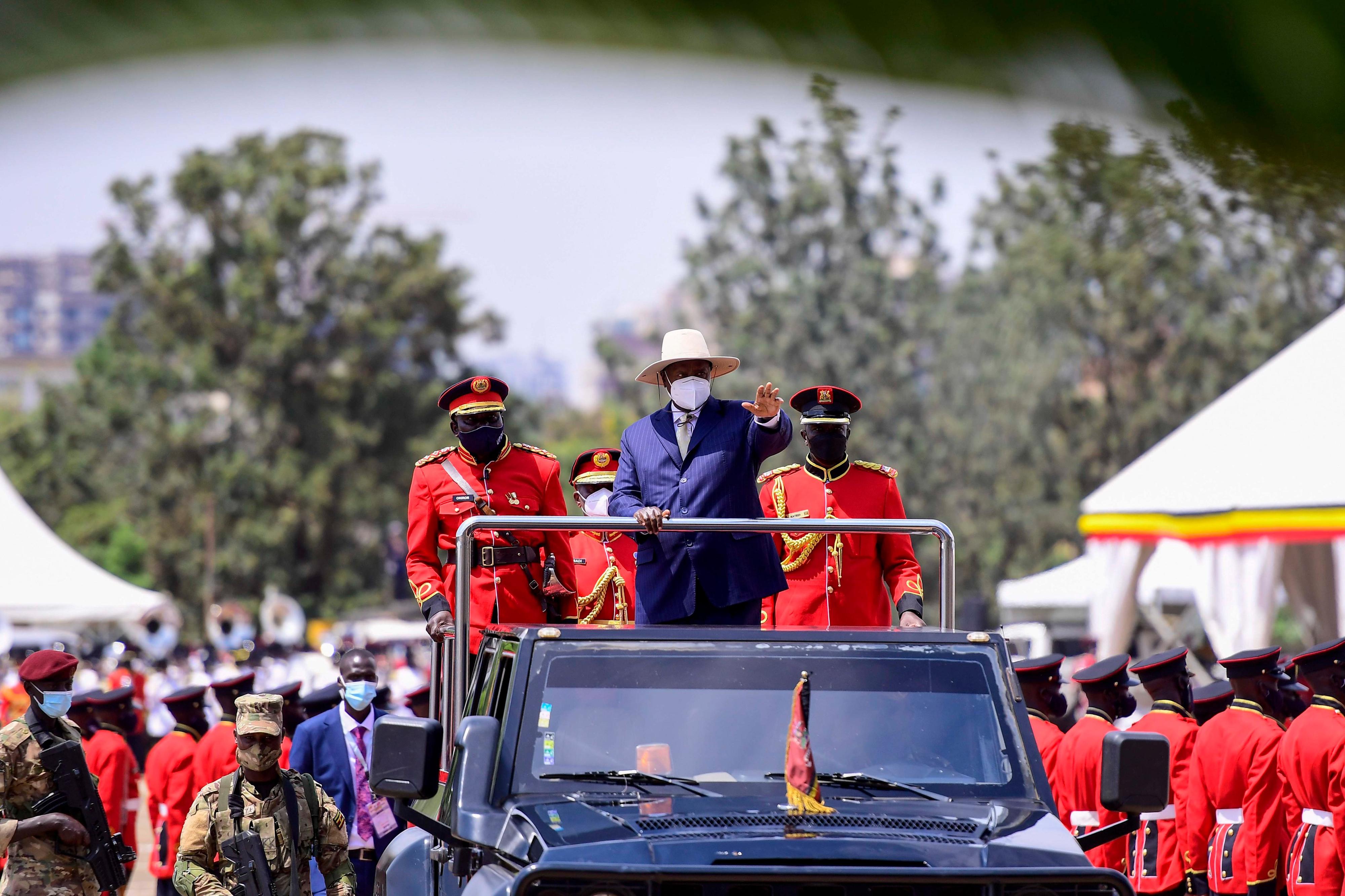Prime
Scorecard of NRM’s 10-point programme

President Museveni (centre), First Lady Janet Museveni (right) and Prime Minister Robinah Nabbanja (left) commission the Buhimba-Nalweyo-Bulamagi and Bulamagi-Igayaaza-Kakumiro road project as part of the NRM Liberation Day celebrations in Kakumiro District on January 26. PHOTO/ PPU
What you need to know:
- An evaluation of how the NRM has performed insofar as delivering promises made 37 years ago is concerned returns a mixed scorecard.
Last Thursday, President Museveni led the new crop of National Resistance Movement (NRM) cadres into Kakumiro District to commemorate 37 years since the NRM shot its way to power.
Speaking in the home district of Prime Minister Robinah Nabbanja, which is also one of the NRM’s bastions of support, Mr Museveni zoomed in on an economy he believes is on track to achieve middle-income status.
2026; Museveni is the deal, Muhoozi the decoy
Mr Museveni was upbeat about meeting the threshold—posting a Gross Domestic Product (GDP) per capita of $1,030 (about Shs3.8m) and above for three consecutive years.
The optimism and confidence exuded while speaking in Kakumiro resonated with that which prevailed when the NRM 10-point programme was unveiled. Crafted into a document during the course of the guerrilla war, the 10-point programme not only aimed to justify the NRM/A’s decision to wage war against the Milton Obote II government but also provide a blueprint to resuscitate a war-ravaged country.
Dr Frank Nabwiso, who as a member of the NRM/A external wing based in Nairobi, Kenya, contributed to the crafting of the 10-point programme, says it “focused on three major things—the economy, governance and then regional cooperation and Pan-Africanism.”
An evaluation of how the NRM has performed insofar as delivering promises made 37 years ago is concerned returns a mixed scorecard.
Democracy
The restoration of democracy through regular elections that would be “free of corruption and manipulation of the population” was item number 1 on the programme.
Mr Livingstone Ssewanyana, the executive director of the Foundation for Human Rights Initiative (FHRI), says while Uganda has “periodic elections … they are far from being credible.”
“They are neither free nor fair or inclusive,” he adds, with post-election disputes a vindication.
Save for Paul Kawanga Ssemogerere in 1996 and Dr Kizza Besigye in 2011, past electoral outcomes have all been challenged in the country’s apex court. The bone of contention has been the composition and partiality of the Electoral Commission (EC).
Security
The NRM/A has over the years restored the security of persons and property. It has also defeated a number of rebel organisations. Prof Sabiiti Makara, who teaches political science at Makerere University, gives credit to the government not least because “security had been very elusive since the 1970s.
National unity
A combination of political education courses—widely known as Mchaka Mchaka—and the inclusion of Section 41 into the Penal Code Act, has done little to end what is perceived as acts that promote divisions along religious, tribal and ethnic lines. A number of people who have dared to highlight cases of imbalances in the distribution of jobs and services have been charged under that law.
When he was declared winner of the January 2021 polls, Mr Museveni vowed to “engage vigorously with the person pushing the line of sectarianism and parochialism” for purposes of proving that it is “wrong and reactionary.”
While in Kakumiro, Mr Museveni urged the citizenry to shun politicians who ride on sectarianism to take office. This is perhaps the biggest manifestation that the NRM has failed on that front.
National independence
Dr Nabwiso says the NRM has failed in the area of defending and consolidating national independence.
“We said we would promote Ugandans to be the masters of their own economy, but that has failed. Ugandans are not in charge of Uganda’s economy,” he notes, adding, “The economy is controlled by foreigners. That means in terms of making decisions about your economy, you are at a disadvantage as nationals because you are controlled by a big corporation.”
Self-sustaining economy
Prof Makara’s assessment is that the NRM has failed to build an independent, integrated and self-sustaining national economy.
“Nothing much has been done when it comes to poverty alleviation. Every time they bring something, it doesn’t seem to work, beginning with Entandikwa in the 1990s. It seems to be an economy that has worked for the rich,” he observes. “The first mistake that was made was privatisation. Most of the public assets which used to create jobs were privatised to individuals and that money has never been accounted for.”
Corruption, misuse of power
Prof Makara’s assessment of the NRM’s record in dealing with corruption is damning.
“I have been living for the last 60 years and I wonder whether there has ever been a government that has ever been as corrupt as this one in Uganda,” Prof Makara says.
Corruption seems to have reached unprecedented levels. A number of NRM government officials and military officers, including Mr Museveni’s relatives and friends, have been implicated in a litany of scandals in which millions of taxpayers’ money was lost.
The list of scandals include the purchase of Santanas instead of Land Rovers for the NRA; the purchase of junk choppers from Belarus; purchase of undersized uniforms from China; purchase of rotten food rations from South Africa; the controversial sale of the Uganda Commercial Bank to Westmont Land Asia; and the plunder of minerals and timber from DR Congo.
Others are the introduction of ghost soldiers on the army’s payroll; the disappearance of a UPDF paymaster (Capt Dan Byakutaaga) with Shs1.9b meant for soldiers’ salaries; theft of $37m (Shs136b) meant for the fight against HIV/Aids, malaria and tuberculosis, etc.
Ms Cissy Kagaba, formerly of the Anti-Corruption Coalition, says the numerous agencies NRM has formed to fight corruption have largely been ineffective.
“We should have expected a fundamental shift in the fight against corruption. Institutions have been put in place, but ensuring that they are working has not really happened,” she told this publication, adding, “We have seen selective enforcement or implementation of the law and we have seen very high levels of impunity.”
Dealing with dislocations
This is perhaps best seen in efforts to enable bibanja owners [squatters] resident on lands owned by absentee landlords in areas like Buyaga and Bugangaizi and in parts of Buganda. It remains a work in progress.
Intra-Africa co-operation
Uganda under the NRM has been working towards regional integration. That has been met with a measure of success.
Uganda has also been actively involved in liberation efforts in Rwanda, DR Congo and Sudan. Most of the members of the ruling Rwanda Patriotic Front were formally with the NRA, later UPDF, while some of those who fought to oust Mobutu from Congo and those who fought for South Sudan’s independence were assisted by Uganda.
Mixed economy strategy
The NRM initially set out to pursue an economic system, combining private and state enterprise. It, however, seems to have made a 360-degree circle change in the early 1990s when it embraced liberalisation. That led to the privatisation of most of the state enterprises. Whereas privatisation and liberalisation are known to have created lots of wealth in other parts of the world, it did not work for Uganda.
Social Services
Provision of social services, especially in the areas of health and education remains a major challenge. Whereas the government introduced free universal primary and secondary education, there are serious quality assurance issues.
Whereas many health centres have been built in various parts of the country, they are largely understocked, ill-equipped and understaffed. That means they cannot provide the required or desired levels of service.
Whereas programmes like Northern Uganda Social Action Fund (Nusaf) and the Peace, Recovery and Development Plan have been run with a measure of success in some parts of West Nile, northern Uganda and parts of the east, war claimants in Luweero, Busoga, Teso and some parts of the east remain unpaid.
Restocking programmes and compensation packages that had been promised to parts of the north and the east, which were affected by rebellions, have never been fully implemented. The NRM cannot be said to have delivered on this.




